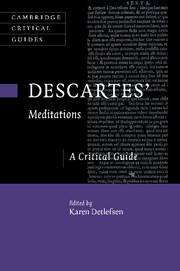Book contents
- Descartes’Meditations
- Series page
- Descartes’Meditations
- Copyright page
- Dedication
- Contents
- Contributors
- Acknowledgments
- Descartes’ texts
- Introduction
- Part I Skepticism
- Part II Substance and cause
- Part III Sensations
- Part IV The human being
- Chapter 8 Teleology and natures in Descartes’ Sixth Meditation
- Chapter 9 The role of will in Descartes’ account of judgment
- Chapter 10 God and meditation in Descartes’Meditations on First Philosophy
- Chapter 11 Cartesian selves
- Bibliography
- Index
Chapter 8 - Teleology and natures in Descartes’ Sixth Meditation
from Part IV - The human being
Published online by Cambridge University Press: 05 February 2013
- Descartes’Meditations
- Series page
- Descartes’Meditations
- Copyright page
- Dedication
- Contents
- Contributors
- Acknowledgments
- Descartes’ texts
- Introduction
- Part I Skepticism
- Part II Substance and cause
- Part III Sensations
- Part IV The human being
- Chapter 8 Teleology and natures in Descartes’ Sixth Meditation
- Chapter 9 The role of will in Descartes’ account of judgment
- Chapter 10 God and meditation in Descartes’Meditations on First Philosophy
- Chapter 11 Cartesian selves
- Bibliography
- Index
Summary
- Type
- Chapter
- Information
- Descartes' MeditationsA Critical Guide, pp. 153 - 175Publisher: Cambridge University PressPrint publication year: 2012
- 3
- Cited by



